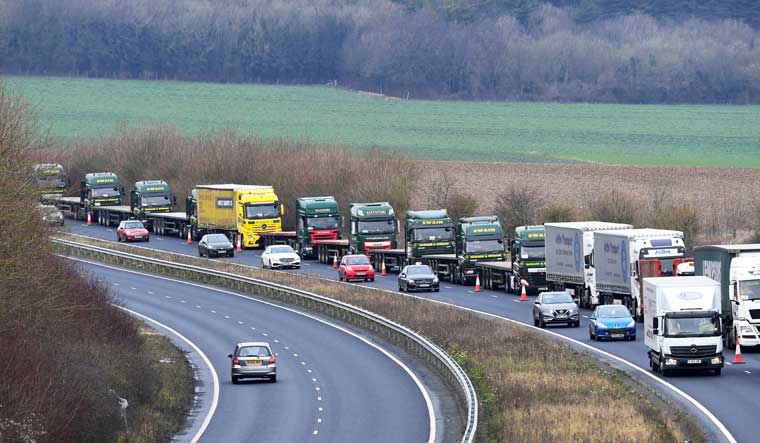
A leaked government memo accessed by the Sunday Times reveals the likely immediate impact of a no-deal Brexit: Food, fuel and medicine shortages, a hard border in Ireland and jammed ports.
According to the memo, the dossier named 'Operation Yellowhammer' shows that the government is planning for a no-deal contingency plan.
According to the leaked memo, the 'base scenario' for a no-deal Brexit will see the UK revert to a 'third country' status with the EU, resulting in an "unsympathetic relationship" with "many member states (under pressure from the European Commission) unwilling to engage bilaterally and implementing protections unilaterally, though some member states may be more understanding."
The memo adds that no bilateral deals were concluded with individual member states, with the exception of a reciprocal agreement on social security coordination with the Republic of Ireland. EU citizens living in the UK will broadly retain all the rights and status that they were entitled to before Brexit.
While a hard border with Ireland will not come into effect on day one, courtesy the government's "no new checks with limited exceptions" model, the memo states that this arrangement is likely to be unsustainable.
In addition, the memo states that "public and business readiness for no-deal will remain at a low level, and will decrease to lower levels, because the absence of a clear decision on the form of EU Exit (customs union, no deal etc) does not provide a concrete situation for third parties to prepare for," warning that a second extension of Article 50 will result in "EU extension fatigue".
Larger businesses will be likely to have better-developed plans than small and medium-sized businesses, with readiness "compounded by seasonal effects and factors such as warehouse availability."
Worryingly, the first day of Brexit will see 50-85 per cent of Heavy Goods Vehicles (HGVs) unprepared for French customs, which could reduce the flow rate to 40-60 per cent of current levels within a single day.
With 60 per cent of medical supplies to the UK coming via the short strait, where delays are likely to be the most severe, disruption to medicine supply could last up to six months.
On food supply, only "certain types" of fresh foods will decrease in supply. An overall shortage of foods will not take place, but availability and choice is expected to decrease while prices are likely to go up, affecting "vulnerable groups".
On fuel, 2,000 job losses are expected to be triggered by the uncompetitive tariffs on UK exports of fuel to EU, with strikes likely at affected refineries. This would result in a "disruption to fuel availability for 1-2 weeks".
The disruption to basic services could leak to protests and "direct action" according to the memo, warning of road blockades as well as the growth of an "illegitimate economy" in the border regions.
In addition, chemicals supply chains that are part of the public water distribution system face a risk of failure, with a local impact affecting "only hundreds of thousands of people".
Michael Gove, Chancellor of the Duchy of Lancaster, commented on the leaks in response to a tweet by the Sunday Times.
"We don’t normally comment on leaks - but a few facts - Yellowhammer is a worst case scenario - v significant steps have been taken in the last 3 weeks to accelerate Brexit planning - and Black Swan is not an HMG doc but a film about a ballet dancer," tweeted Gove, who was a campaign manager for Boris Johnson's leadership bid of the Conservative party before he resigned and ran for the post himself.
Prime minister Boris Johnson is expected to travel to Berlin shortly to negotiate another deal with the EU, via a meeting with German Chancellor Angela Merkel and French President Emmanuel Macron. A breakthrough in negotiations is, at present, viewed as unlikely.

No comments:
Post a Comment